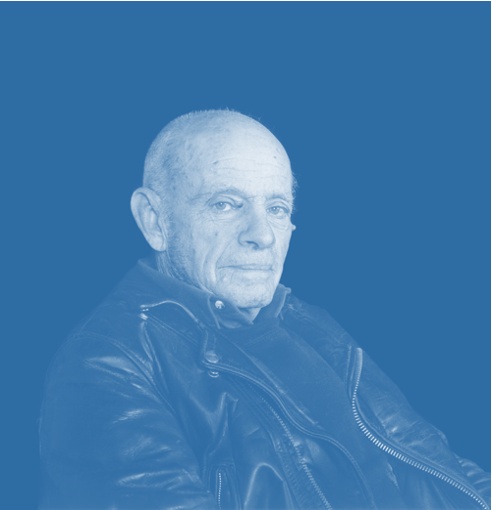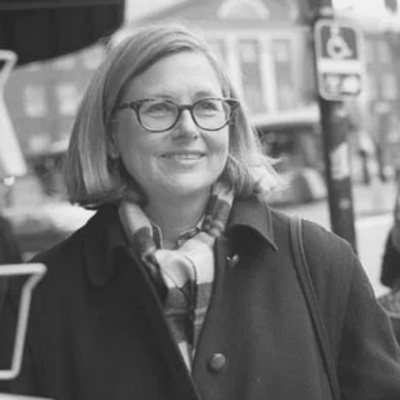On The Brinck

Call for Nominations for the 2026 On the Brinck Book Awards
The UNM School of Architecture + Planning is currently accepting nominations for the 2026 On the Brinck Book Awards. This annual competition honors contemporary and emerging values in design by celebrating books that offer new perspectives and resonate with the formative writings of J.B. Jackson. The selection criteria for this competition come directly from Jackson’s enlightened approach to scholarship: emphasizing new and overlooked areas of study, challenging existing scholarship, integrating allied disciplines, and appealing to a broad readership.
2025 On the Brinck Award Winners
2025
The University of New Mexico School of Architecture + Planning (UNM SA+P ) is pleased to announce the winners of the 2025 On the Brinck Book Award and Lecture series, created in honor of John Brinckerhoff Jackson.

Cayer, Aaron, Incorporating Architecture: How American Architecture Became a Practice of Empire, UC Press, 2025
Cayer’s Incorporating Architecture takes on an important and understudied topic, the business of architecture. Cayer lays out a scale and history of a practice and introduces the context of the larger economy and various national and international trends that influence the growth of AECOM. In particular, AECOM’s embrace of military landscapes and installations including the Trident missile is fascinating. This relevant volume traces how AECOM’s concept of “total planetary practice” changed architecture. The scale of projects discussed sheds unexpected light on takeovers and mergers of AECOM, delineated through oral histories and on the ground reporting. This excellent example of research methods persists when Cayer is denied access to official archives causing him to turn to personal relationships and boxes of marginalia. This is a very good study of a practice and will illuminate for students the corporate side of the architectural practice. This book embeds its reader in the drama of the mundane in a manner that humanizes the people drafting and laboring in the service of Pelli’s aesthetic of the expanse.
McInnis, Jarvis C., Afterlives of the Plantation: Plotting Agrarian Futures in the global Black South, Columbia University Press, 2025
The jury celebrates McInnis’ well-researched, beautifully written, and ground-breaking work that crosses disciplines to be a fresh take on place and African American histories. He argues for the rural South as a space of resistance embodied through the plantation that becomes Tuskegee Institute/University. Describing the founding practices of Booker T. Washington and his teaching about agriculture and culture, McInnis develops an argument for the reframing of successful agriculture as rebellion against the monocropping and environmental devastation wrought by the human devastation of enslavement as well as a way to lay claim to place. Using eco-ontologies as a theoretical frame, this place-based narrative weaves documents and art from Zora Neale Hurston alongside other writers/designers into the archives. This work knits a narrative that fits the place-based criteria of this award in a broad swath of new knowledge around black modernity.
Smith, Jen Rose, Ice Geographies: The Colonial Politics of Race and Indigeneity in the Arctic, Duke University Press, 2025
Smith investigates ice as a material, as a place, and as an ideology. In a concise, effective, and well researched narrative, she changes how we think about land/water/ice, turning around conceptions of dead, lifeless, spaces to rich inhabited arctic places. In a literal new materialism, Smith’s ice has agency in her indigenous ontologies of the Arctic. This volume weaves multi-disciplinary modes of expression from lyric reflection to art critique to place based politics. The jury appreciated the description of local, detailed, and lived-in places as well as Smith’s expansive theory of the connections of those places through the conditions of arctic-ness. This book makes a definitive contribution by pushing back assumptions about people who live in, around, and on ice and the nature of those places themselves. In the context of climate change and the rapid disappearance of ice, Smith’s work offers engagement beyond memorialization using a framework she calls “careful guesswork.” This work weaves a startling and embodied relationship to ice for her readers in an excellent mix of approaches to environmental humanities research, material studies, and indigenous studies research.
Taylor, Sunarua, Disabled Ecologies: Lessons from a Wounded Desert, UC Press, 2024
The jury applauds Taylor’s work bringing together various fields of studies: civil rights, decolonialism, ethnic studies, environmental studies, and health, in a convincing mixture of best practices in environmental justice research and disability studies. Taylor weaves many scales into a single narrative. She investigates this one place, the Tucson desert, from its involvement in global wars through weapons manufacture and export to intimate bodily impacts of dumping trichloroethelyne in a place she shows as layered, inhabited, and intricate. She redefines the desert “blank slate” as deep with aquifers and stories, both personal and informative, not a dump for toxic materials. Taylor’s desert form is replicated in her complex but readable footnote system and the inclusion of poems and paintings as multiple forms of expression in this researched work. This personal and informative narrative teaches an ethic that values the earth that has been impacted rather than dismissing it as impure or having no wilderness value. Disability studies are a lens for landscapes; the discussion is not about universal access to wilderness, but about values around impairment, seeing the landscape as a body to be respected in all its states.
Selection Criteria:
This award recognizes books that meet these criteria:
- Books that emphasize new and overlooked areas of study
- Books that challenge existing scholarship
- Books that integrate allied disciplines of planning, architecture, landscape architecture, and design
- Books that appeal to a broad readership
- Books that embody a pedagogical innovation along the lines of Jackson's work
- Books published in the last three years (2023-2025)
- Art or design monographs and edited volumes will not be considered.
- Previously nominated books may be re-considered if they fall within the three-year frame
Nominations – Round One (Deadline: June 1, 2026)
Please fill out the application for the On the Brinck Book Awards with the following information and materials:
- The date the book was published, title, author(s), and publisher contact information
- A brief description of how the book meets the selection criteria listed above.
- A PDF copy of the entire book.
- Any evidence of the book’s reach and impact (book reviews, supportive documentation) may also be submitted.
All books submitted will receive a preliminary review from the On the Brinck Program Director, Catherine Page Harris in pdf format from publishers. OTB will contact publishers of selected books to request sending physical copies to the jury for the first round of reviews. These books will be evaluated by a jury of scholars and practitioners, and coordinated by the On the Brinck Program Director from the University of New Mexico School of Architecture & Planning (UNM SA+P) to create a shortlist of ten books.
Jury Deliberations – Round Two
Books nominated for the shortlist will be further evaluated by the jury. The jurors will meet in person in late 2026 to select finalists and winners of the On the Brinck Book Award.
Award Recognition
Three winning books will be recognized each year, two general and one focused on pedagogy. The awards will be announced in late Fall 2026 or Winter 2027. For each award, author(s) will be invited to lecture at the University of New Mexico School of Architecture & Planning in 2027. You can view past winners of this award on the UNM SAAP website.
Please email us at onthebrinckbookaward@gmail.com with any questions regarding the application.
Past Winners
2025
Caroline Tracey, “The Sanctuary Movement”, UNM SA+P Public Lecture, November 3, 2025
On the Brinck | Places Prize Winner
Cayer, Aaron, Incorporating Architecture: How American Architecture Became a Practice of Empire, UC Press, 2025
McInnis, Jarvis C., Afterlives of the Plantation: Plotting Agrarian Futures in the global Black South, Columbia University Press, 2025
Smith, Jen Rose, Ice Geographies: The Colonial Politics of Race and Indigeneity in the Arctic, Duke University Press, 2025
Taylor, Sunarua, Disabled Ecologies: Lessons from a Wounded Desert, UC Press, 2024
2024
The Shape of Utopia: The Architecture of Radical Reform in Nineteenth Century America, Irene Cheng
The Garden in the Machine, Avigail Sachs
In the Land of the Patriarchs: Design and Contestation in West Bank Settlements, Noam Shoked
2023
Plant Life: The Entangled Politics of Afforestation, Rosetta S. Elkin
The Architecture of Disability: Buildings, Cities, and Landscapes Beyond Access, David Gissen
Historic Real Estate: Market Morality and the Politics of Preservation in the Early United States, Whitney Martinko
A House for the Struggle: The Black Press and the Built Environment in Chicago, E. James West
2022
Building Antebellum: New Orleans Free People of Color and Their Influence, Tara A. Dudley
Landed Internationals: Planning Cultures, the Academy, and the Making of the Modern Middle East, Burak Erdim
Where Dragon Veins Meet: The Kangxi Emperor and His Estate at Rehe, Stephen H. Whiteman
2021
Building Character: The Racial Politics of Modern Architectural Style, Charles L. Davis
Designs for the Pluriverse: Radical Independence, Autonomy, and the Making of Worlds, Arturo Escobar
Spiral to the Stars: Mvskoke Tools of Futurity, Laura Harjo
2025 On The Brinck Winners
2024 On The Brinck Winners
2023 On The Brinck Winners
2022 On The Brinck Winners
2021 On The Brinck Winners
Public Programs
2022 On the Brinck Book Symposium featuring Tara A. Dudley, Burak Erdim, and Stephen H. Whiteman
2021 On the Brinck Book Conversation featuring Arturo Escobar and Laura Harjo
2021 On the Brinck Book Conversation featuring Charles Davis II and Catherine Seavitt-Nordenson
The Jury

Coordinating Juror
Catherine Page Harris, Interdisciplinary Assistant Professor, teaches Art and Ecology and Landscape Architecture at the University of New Mexico in a split position with the College of Fine Arts and the School of Architecture and Planning. She received her BA from Harvard University, 1988, MLA from UC Berkeley, 1997, and MFA from Stanford University, 2005. Harris works in art/design, and digital/analog expressions. Her built work resides at Marble House Project, Dorset, VT, Deep Springs College, White Mountains, CA, McCovey Field, SF, CA and The Violin Shop in Albuquerque, NM, among other sites.

David Gissen is an author, designer, and educator who works in the fields of architecture, landscape, and urban design. His most recent book, The Architecture of Disability (University of Minnesota Press, 2023) has been praised as “an exhilarating manifesto” and a “complete reshaping about how we view the development and creation of architecture.” David is Professor of Architecture and Director of the Ph.D program at The School of Architecture, Yale University. He lectures and teaches internationally in the areas of architecture, interior, urban, and landscape history, theory, and design, which hae included public lectures at the Museum of Modern Art, Princeton University, Harvard University, and The Center for Architecture, New York. David offers consultation, workshops, and strategic planning for museums, municipal governments and agencies, design firms, and institutions seeking to bring complex disability perspectives into their organization.

Felipe Correa is a professor and the chair of UVA School of Architecture. He is an internationally renowned architect, urbanist, and founder of his design practice Somatic Collaborative. He has served as director of the Master of Architecture in Urban Design program at Harvard University’s Graduate School of Design. He is the author of São Paulo: A Graphic Biography (2018), Beyond the City: Resource Extraction in South America (2016), and Mexico City: Between Geometry and Geography (2015). He is the co-editor of Lateral Exchanges: Architecture, Urban Development, and Transnational Practices, a publication that explores the role of architecture and urbanism in the context of international development.

Margaret Crawford is the Director of Master of Urban Design and Professor of Architecture and Urban Design at UC Berkeley and holds degrees in architectural history, housing, and urban planning. Prior to Berkeley, Crawford chaired the History, Theory, and Humanities Program at SCI-Arc in Los Angeles and, from 2000–2009, was professor of urban design and planning theory at the Harvard GSD, teaching history and design workshops and studios. Her scholarly work includes Building the Workingman’s Paradise: The History of American Company Towns, The Car and the City: The Automobile, the Built Environment and Daily Urban Life, and two editions of Everyday Urbanism, along with numerous articles and book chapters on immigrant spatial practices, shopping malls, public space, and other issues in the American built environment.

Charles L. Davis II is an associate professor of architectural history and criticism at UT Austin’s School of Architecture. He received his PhD in architecture from the University of Pennsylvania and an M.Arch and B.P.S. from the University at Buffalo. His academic research excavates the role of racial identity and race thinking in architectural history and contemporary design culture. He has published articles and essays in Architectural Research Quarterly, Journal of the Society of Architectural Historians, Harvard Design Magazine, Log, Aggregate, Append-x and VIA.

Cathy Lang Ho is an independent architecture writer, editor, and curator based in New York. She consults on diverse projects dealing with architecture, design, landscape, and urbanism. Recent projects include launching and organizing Harvard University GSD’s Wheelwright Prize and Richard Rogers Fellowship, and creating public programs on New York’s Governors Island. She is a contributing editor to Architect magazine and founder and former editor-in-chief of The Architect’s Newspaper (2003–07). She was previously an editor at Architecture magazine (1999-2001, editor-at-large 2001–05) and Design Book Review (1992–99), an award-winning literary journal. Her writing has appeared in publications worldwide, including Domus, Blueprint, and the New York Times. She was the recipient of the Rome Prize (2008–09, Design) and is currently a member of the AAR Society of Fellows Council. In 2012, she was the commissioner and lead curator of the U.S. Pavilion at the Venice Architecture Biennale. She is a former board member of the Institute for Urban Design and has served on numerous awards juries and nominating committees.

Thaïsa Way is the program director in Garden and Landscape Studies at Dumbarton Oaks, Washington, D.C. She holds a professorship of landscape architecture at the University of Washington. An urban landscape historian teaching and researching history, theory, and design, she has published and lectured on feminist histories of landscape architecture and public space in cities. She is the author of Unbounded Practices: Women, Landscape Architecture, and Early Twentieth Century Design (2009), which won the 2012 J. B. Jackson Book Award, and From Modern Space to Urban Ecological Design: The Landscape Architecture of Richard Haag (2015). She has co-edited two volumes, Now Urbanism (2013) and River Cities, City Rivers (2018).

Irene Cheng is an architectural historian, critic, and educator. She is chair of the graduate Architecture program at California College of the Arts (CCA) and co-director of History Theory Experiments (HTX). Her most recent book is The Shape of Utopia: The Architecture of Radical Reform in Nineteenth-Century America (University of Minnesota Press, 2023). The publication explores architectural and urban designs affiliated with anarchist, socialist, abolitionist, free love, spiritualist, and other radical movements. Cheng is a founding principal of Cheng+Snyder, a multidisciplinary design practice that seeks to instigate critical debates about politics, architecture, and the city. Cheng is a recipient of the ACSA Diversity Achievement Award and the AIA San Francisco Community Alliance Education Award. Her work has been supported by fellowships at the McDowell Colony, the McNeil Center at the University of Pennsylvania, and grants from the National Endowment for the Humanities, Graham Foundation, and Whiting Foundation.

